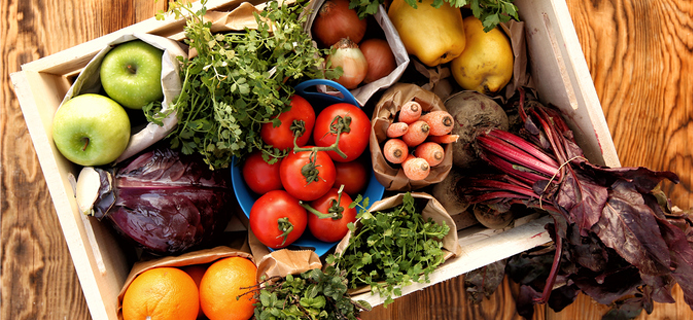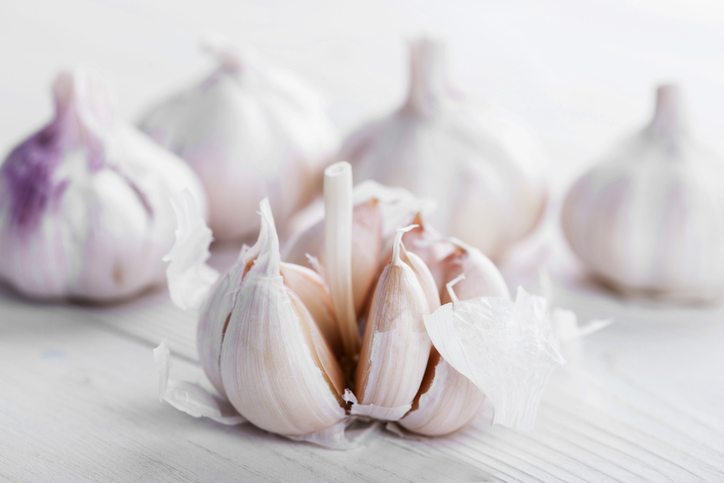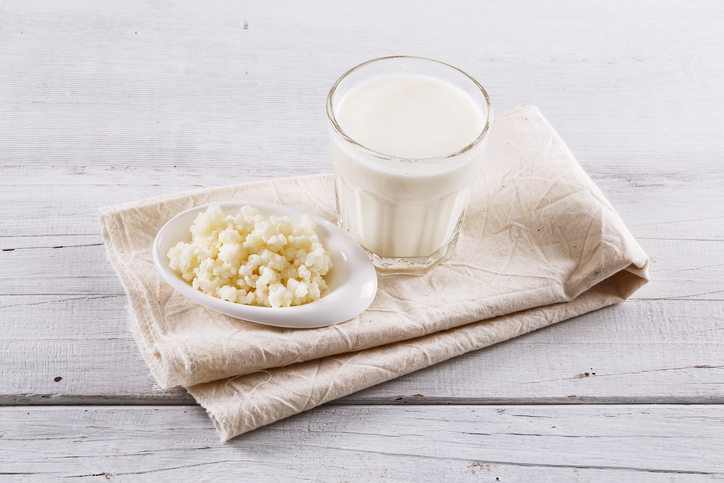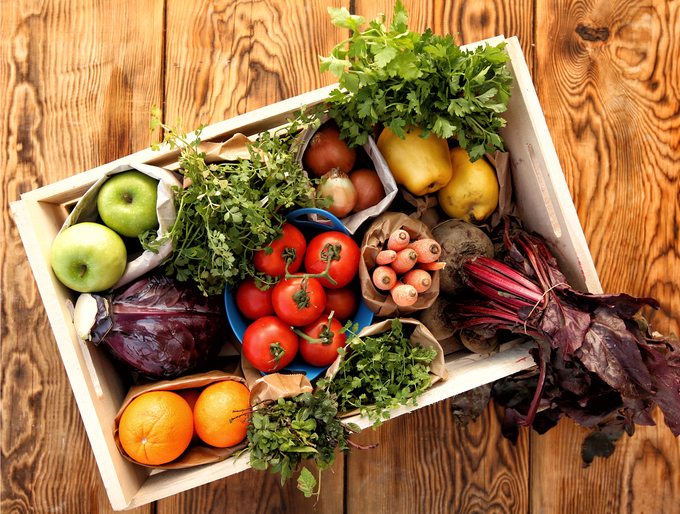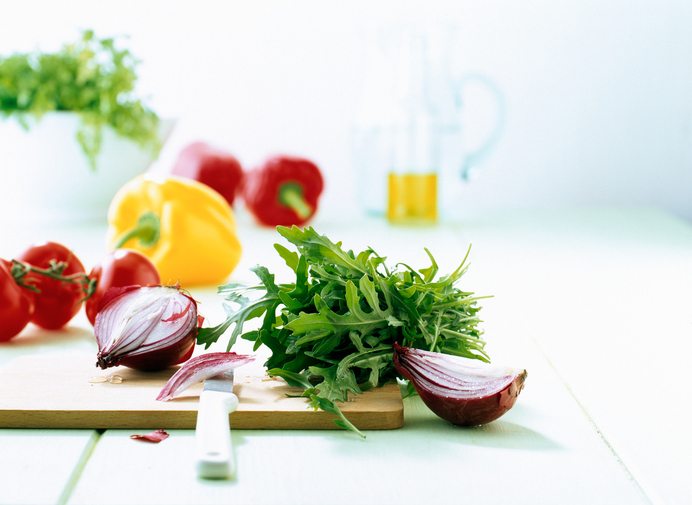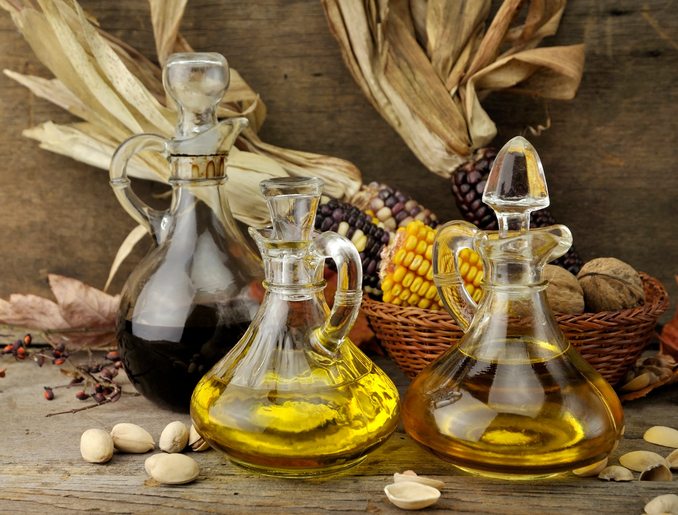Looking for foods to help your bloating you can try right now? Nutritionist and author of The Gut Makeover Jeanette Hyde reveals 11 foods that can relieve your symptoms
Do you find your abdomen blows up after you’ve eaten? Ever looked in the mirror after dinner and thought you suddenly looked six months pregnant? This is one of the most common problems both women, and men, come to see me about in my private practice. There are many sources of food to help stop it.
Garlic and fresh oregano
In some people bloating is caused by a parasite infection or overgrowth of yeast or certain bad bacteria in the gut. These all adore and thrive on sugar so try to cut these out. Include anti-microbial foods in your diet to kill/keep at bay parasites/yeast/bad bacteria. Chop garlic into your salad dressings, and use as a base in soups and stews. You could steep fresh oregano leaves in hot water to make a tea, or chop fresh leaves into your salad dressings, soups and stews. Garlic and oregano are at the base of much Mediterranean cooking and it makes sense. If a parasite infection is suspected, see your GP for diagnosis and further advice.
Dairy alternatives
Replace your usual dairy milks with fermented milk kefir or unsweetened almond milk. Many people feel bloated and windy after regular milk treats like lattes or ice cream because their gut doesn’t produce enough of an enzyme called lactase to break the natural sugar called lactose down properly. You could choose an almond milk instead (checking it doesn’t contain soapy gut irritant stabilisers and gums, I recently found Ecomil and Provamel have versions which are ok). Or try fermented milk kefir (which is like a fizzy drinking yoghurt) which has only tiny amounts of lactose left in it after fermentation process making it easier to digest.
MORE: 10 surprising signs of gut problems
Vegetables and fruits
Replace your wheat white stodge such as cereal/bread/pasta with oodles of brightly coloured vegetables instead – aim for 20-30 different types in a week. Many of us eat a mono diet, ie masses of one particular grain all day, leaving little space on the plate for a variety of colours and fibre which are needed to feed the good bacteria in the gut, leading to less bloating. For example breakfast cereal for breakfast, a sandwich for lunch, pasta for dinner with just brief appearances of colour such as a couple of slices of tomato in that sandwich, and smear of pesto on the pasta mean there is a lot of just one colour and grain there.
Instead have a shake up: mix almond milk or kefir with a handful of berries, or any other fruit you fancy to keep up the variety, with some flaxseeds (which you could vary with any other nuts or seeds you fancy). Have a nicoise salad for lunch, or for dinner have some grilled salmon alongside a tray of roasted Mediterranean vegetables with lashings of extra virgin olive oil to feed the good bacteria in the gut.
Keep a food symptom diary and identify the food offenders
Some people are afraid of vegetables incase they cause them to bloat. Keep a food and symptom diary – what you eat on one side of the page, and when the symptoms appear on the other side. Try to identify a pattern and then leave out of your diet the foods which seem to be the offenders. If it’s leeks or mushrooms, or garlic, whatever in your individual case – there are plenty more options out there, and it would be a shame not to be getting the benefits from all the other vegetables for fear of a few.
MORE: Want more energy? Eat to support your thyroid
The more diverse vegetables, herbs and fruit in the diet, the more different types of colours and fibre you are giving the good bacteria in your gut to feed on. When they are happy, your gut will be happy too, and hopefully the bloating protestations go!
Rocket leaves, chicory, or radiccio
Get into the habit of having a handful of rocket leaves, chicory, or radiccio as a starter with extra virgin olive oil and a squeeze of lemon juice on top before your main course. Bitter leaves can help you digest your food better, leading to less bloating further down the digestive tract.
Apple cider or red wine vinegar, and olive oil
Apple cider vinegar gets all the attention, but any vinegar mixed into some olive oil on a salad can help trigger stomach acid to be released to help with better digestion, and therefore less bloating. I like red wine vinegar. It tastes great, and you can also benefit from the polyphenols in it – that’s the red pigment that good bacteria in the gut feed on. When the good bacteria are dominating the ecosystem in your gut, there is less chance of bloating. Chop some fresh chopped tomatoes and sprinkle with a little sea salt to bring out the flavour, then drizzle over some extra virgin olive oil which also contains polyphenols for a happy gut.
Jeannette Hyde
, £6.99, and The Gut Makeover Recipe Book
, £6.29.
Follow on Twitter: @jeannettehyde
Instagram: jeannettehydenutrition
Like this article? Sign up to our newsletter to get more articles like this delivered straight to your inbox.



